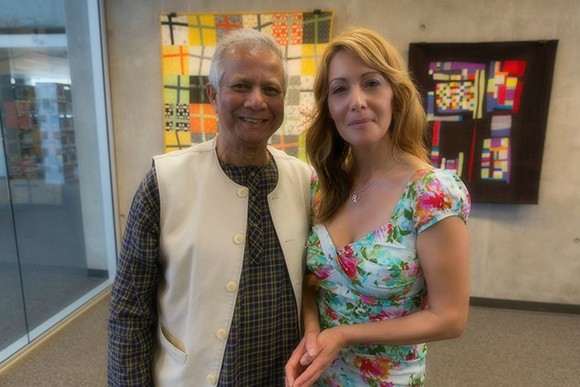Op/ed: Collaboration is the key to ending hunger in the Tri-Counties

Ventura County FOOD Share CEO Bonnie Weigel, right, with Nobel laureate Muhammad Yunus. (courtesy photo)
By Bonnie Weigel
“This is what we know to be true: business is good because it creates value, it is ethical because it is based in voluntary exchange, it is noble because it can elevate our existence, and it is heroic because it lifts people out of poverty and creates prosperity.” — John Mackey, founder Whole Foods Market.
During the past five years, Ventura County FOOD Share has continued to meet the growing needs of undernourished people in our communities. We have witnessed growth from serving 33,000 people per month to more than 74,500 today.
And for the past two years, I have had the privilege of helping to lead and work on national hunger-relief nonprofit Feeding America’s diversity inclusion team, speaking on panels advocating for hunger alleviation. As advocates for finding lasting solutions to bring those we serve to a state of stability, we often ask the following question: “How can we continue to grow in our ability to feed the line of hungry friends, but work to shorten the line forever through self-sufficiency?’’
Through this work, the Feeding America Collaborating for Clients, or C4C, advisory team was formed. It is a multi-year effort that aims to find ways to plan and implement local collaborative initiatives that address client stability and self-sufficiency.
The national effort has been generously funded by the Laura and John Arnold Foundation, and research for the first phase of the 38-week-long planning process is being conducted by the Urban Institute, an independent nonprofit research organization.
Ventura County’s FOOD Share is now a partner of national hunger relief nonprofit Feeding America’s C4C Initiative, as well as Ventura County Together’s C4C Task Force Initiative.
Through these national and local initiatives, we have begun the process of finding long-term solutions to help America’s impoverished peoples become truly self-sufficient.
The Ventura County initiative is currently in its research phase, with CSU Channel Islands’ California Institute for Social Business playing a lead role. We are privileged to have civil society leader and Nobel Peace Prize winner Muhammad Yunus on board.
Yunus, who founded the Grameen Bank and pioneered the concepts of microcredit and microfinance to successfully pull people around the world out of poverty, has joined in our mission to help us establish a social business model.
This local initiative would also not be possible without Esper Petersen Jr., director of his late father’s nonprofit, The Esper A. Petersen Foundation, which is donating $500,000 to enable FOOD Share to lead the C4C efforts in the region.
The pathway toward self-sufficiency is not created overnight. It requires collaboration. Cross-sector collaboration can be challenging, but it is the key to establishing this path to stability for those we serve.
Working collaboratively reminds us that our mission is never about us as an organization — it’s about meeting the needs of those we serve to the best of our ability, which can only be achieved by working hand-in-hand with our partners.
Our partners come from the nonprofit, education and government sectors, as well as the corporate and professional world.
To our partners in our mission for self-sufficiency, thank you for believing in this work and helping to provide the foundation that allows us to do what we do. We commit to you that we will continue to steward our community of stakeholders toward collective impact to meet our mission, and ask that you stay engaged, share our message and invite others to invest alongside you.
For more information about the C4C initiative, our programs or services that FOOD Share stewards, please call me or visit www.foodshare.com.
• Bonnie Weigel is president and CEO of FOOD Share, Ventura County’s nonprofit food bank, and the head of the C4C initiative. Contact her at [email protected].










